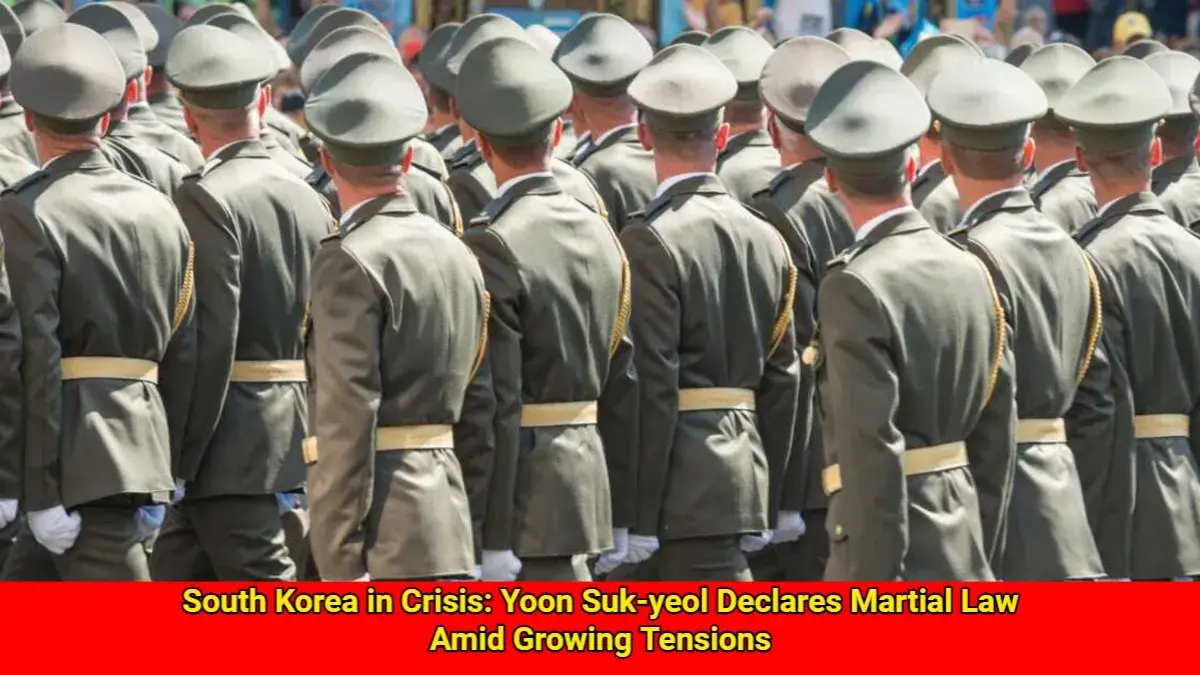South Korea in Crisis: December 3, 2024 – In a stunning development today, South Korea’s President Yoon Suk-yeol has declared martial law across the country. The decision follows a series of escalating tensions, which have left many people in South Korea, and around the world, anxious about the future. Louis Martin, a political analyst, explores the reasons behind the president’s decision and the potential impact on the country.
What is Martial Law?
Martial law is a temporary rule by military authorities, typically imposed during times of national emergency or crisis. Under martial law, regular laws can be suspended, and the military has authority over civil law enforcement. Citizens may face curfews, travel restrictions, and military patrols on the streets. Public gatherings could be banned, and the media may be controlled or censored.
The declaration of martial law is a rare and serious measure in any country. It often signals that the government believes a situation has reached a point where normal legal systems can no longer control it. In South Korea, this move is being seen as a direct response to growing political unrest, public protests, and national security concerns.
Why Did President Yoon Declare Martial Law?
The situation in South Korea has been tense for months. Protesters have been taking to the streets, demanding the government take stronger action on various issues, including corruption, economic struggles, and security challenges related to North Korea. The protests have intensified over time, with citizens feeling that their voices are not being heard.
In addition to the internal unrest, South Korea has been dealing with heightened threats from North Korea. There have been several missile tests, military provocations, and rising fears of possible conflict. This has put additional pressure on the government to take swift and decisive action to ensure national security.
Louis Martin suggests that the combination of domestic turmoil and external security threats may have pushed President Yoon to make this dramatic decision. He believes the martial law declaration is a way to regain control and stabilize the country before things spiral further out of hand.
What Does Martial Law Mean for South Korea?
The martial law declaration is expected to change daily life for the people of South Korea in several ways. The most immediate impact will likely be the increased presence of military personnel in major cities. Roads could be blocked, and checkpoints set up to control movement. The government might impose curfews to limit the freedom of movement during the night.
People could also face restrictions on public demonstrations. Protests have been a common sight in South Korea in recent months, but under martial law, these gatherings could be banned. The government may also limit or monitor online activity to prevent the spread of information it considers harmful to national security.
This measure could also have a significant impact on South Korea’s economy. Prolonged unrest and restrictions on movement may slow down businesses, especially in the tourism, retail, and transportation sectors. Additionally, the uncertainty may affect investor confidence, potentially leading to market instability.
How Are People Reacting?
The reaction to President Yoon’s decision has been mixed. Many people support the move, seeing it as necessary to restore order and stability. They argue that the country’s security is at risk, and martial law is the only way to ensure the safety of the people.
On the other hand, there are many who are deeply concerned about the move. Human rights groups have warned that martial law could lead to abuses of power, curbing citizens’ freedoms and suppressing political opposition. There are also fears that the decision could fuel further protests, leading to more violence and division within the country.
The protests, which began as peaceful demonstrations, have become increasingly intense in the past few months. Now, the declaration of martial law may serve as a spark for even more public unrest, as people rally against the president’s decision.
Louis Martin points out that this kind of move can often backfire. History has shown that imposing martial law can create more anger and frustration among the public, especially when people feel their rights are being infringed upon.
What Happens Next?
The situation in South Korea is still evolving. President Yoon’s decision to declare martial law comes at a critical time for the nation. The military’s role in enforcing the measures will be closely monitored by both the government and the public. The world will be watching to see how this decision plays out.
In the coming days, President Yoon may address the nation to explain his actions and reassure citizens. The government will likely implement more measures to control protests and stabilize the situation. However, there is also the possibility that the unrest could continue, and the protests may escalate, leading to a dangerous cycle of violence and repression.
Internationally, the declaration of martial law in South Korea is being watched closely. Many countries, especially those in the region, are concerned about the potential for further instability in East Asia. As a key ally of the United States, South Korea’s political situation is critical to global security.

